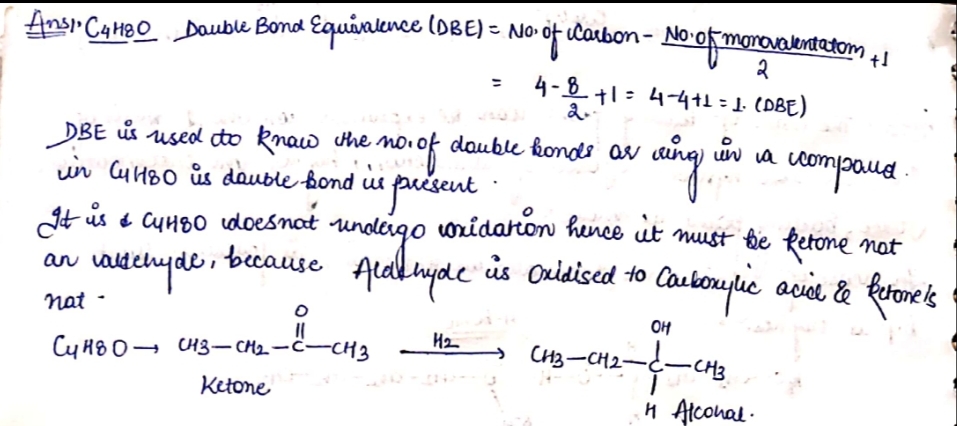2. An unknown organic compound has the molecular formula CaH&O. It resists oxidation and it can be reduced with H2 to form an alcohol. Draw the structure for the compound and write equations for the reactions described. Name the reactant and product. 3.Draw the structures for 2,3-dimethylhexanal undergoing the following reactions: Oxidation Reduction with H2 Draw the structures for 2-methyl-3-hexanol undergoing the following reactions: Intramolecular dehydration Oxidation Rank the following from lowest to highest boiling point. Explain your ranking. Butanal, 1-butanol, butane Both ethane and ethanol contain 2 carbon atoms. Ethane is a gas at room temperature and is insoluble in water, whereas ethanol is a liquid at room temperature and is very soluble. Explain the reasons for the differences in the properties of these compounds.
2. An unknown organic compound has the molecular formula CaH&O. It resists oxidation and it can be reduced with H2 to form an alcohol. Draw the structure for the compound and write equations for the reactions described. Name the reactant and product. 3.Draw the structures for 2,3-dimethylhexanal undergoing the following reactions: Oxidation Reduction with H2 Draw the structures for 2-methyl-3-hexanol undergoing the following reactions: Intramolecular dehydration Oxidation Rank the following from lowest to highest boiling point. Explain your ranking. Butanal, 1-butanol, butane Both ethane and ethanol contain 2 carbon atoms. Ethane is a gas at room temperature and is insoluble in water, whereas ethanol is a liquid at room temperature and is very soluble. Explain the reasons for the differences in the properties of these compounds.
Chemistry
10th Edition
ISBN:9781305957404
Author:Steven S. Zumdahl, Susan A. Zumdahl, Donald J. DeCoste
Publisher:Steven S. Zumdahl, Susan A. Zumdahl, Donald J. DeCoste
Chapter1: Chemical Foundations
Section: Chapter Questions
Problem 1RQ: Define and explain the differences between the following terms. a. law and theory b. theory and...
Related questions
Question

Transcribed Image Text:2. An unknown organic compound has the molecular formula C4H&O. It resists oxidation and it can be
reduced with H2 to form an alcohol. Draw the structure for the compound and write equations for the
reactions described. Name the reactant and product.
3. Draw the structures for 2,3-dimethylhexanal undergoing the following reactions:
Oxidation
Reduction with H2
Draw the structures for 2-methyl-3-hexanol undergoing the following reactions:
Intramolecular dehydration
Oxidation
Rank the following from lowest to highest boiling point. Explain your ranking.
Butanal, 1-butanol, butane
Both ethane and ethanol contain 2 carbon atoms. Ethane is a gas at room temperature and is insoluble
in water, whereas ethanol is a liquid at room temperature and is very soluble. Explain the reasons for
the differences in the properties of these compounds.
Expert Solution
Step 1

Step by step
Solved in 4 steps with 4 images

Knowledge Booster
Learn more about
Need a deep-dive on the concept behind this application? Look no further. Learn more about this topic, chemistry and related others by exploring similar questions and additional content below.Recommended textbooks for you

Chemistry
Chemistry
ISBN:
9781305957404
Author:
Steven S. Zumdahl, Susan A. Zumdahl, Donald J. DeCoste
Publisher:
Cengage Learning

Chemistry
Chemistry
ISBN:
9781259911156
Author:
Raymond Chang Dr., Jason Overby Professor
Publisher:
McGraw-Hill Education

Principles of Instrumental Analysis
Chemistry
ISBN:
9781305577213
Author:
Douglas A. Skoog, F. James Holler, Stanley R. Crouch
Publisher:
Cengage Learning

Chemistry
Chemistry
ISBN:
9781305957404
Author:
Steven S. Zumdahl, Susan A. Zumdahl, Donald J. DeCoste
Publisher:
Cengage Learning

Chemistry
Chemistry
ISBN:
9781259911156
Author:
Raymond Chang Dr., Jason Overby Professor
Publisher:
McGraw-Hill Education

Principles of Instrumental Analysis
Chemistry
ISBN:
9781305577213
Author:
Douglas A. Skoog, F. James Holler, Stanley R. Crouch
Publisher:
Cengage Learning

Organic Chemistry
Chemistry
ISBN:
9780078021558
Author:
Janice Gorzynski Smith Dr.
Publisher:
McGraw-Hill Education

Chemistry: Principles and Reactions
Chemistry
ISBN:
9781305079373
Author:
William L. Masterton, Cecile N. Hurley
Publisher:
Cengage Learning

Elementary Principles of Chemical Processes, Bind…
Chemistry
ISBN:
9781118431221
Author:
Richard M. Felder, Ronald W. Rousseau, Lisa G. Bullard
Publisher:
WILEY